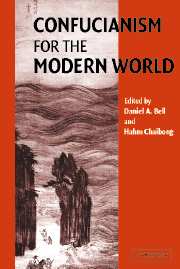Book contents
Introduction: The Contemporary Relevance of Confucianism
Published online by Cambridge University Press: 28 August 2009
Summary
Confucians have long been preoccupied with social and political change. According to the standard account, Master Kong (Latinized name: Confucius; c. 551—479 B.C.) left his native state of Lu, hoping to find a ruler more receptive to his ideas about good government. Unfortunately, Confucius did not have any luck, and he was forced to settle for a life of teaching. Several generations later, a student in the academic lineage of Confucius's grandson named Master Meng (Latinized name: Mencius: c. 390—305 B.C.) committed himself to spreading Confucius's social and political ideas. Like the old master, Mencius moved from state to state, looking for opportunities to put his political ideals into practice. Mencius had slightly more success — he served briefly as Minister of the State of Qi — but he became disenchanted with political life and reluctantly settled for a teaching career.
Several hundred years later, however, the social and political ideas of Confucius and Mencius — as recorded in The Analects of Confucius and The Works of Mencius — proved to be literally world transforming. Following a shortlived experience with Legalism, the newly founded Chinese state of Han adopted Confucianism as its official ideology. For the next two thousand years, the country's best minds sought to interpret and modify Confucianism to make it more relevant in particular situations with novel features.
- Type
- Chapter
- Information
- Confucianism for the Modern World , pp. 1 - 28Publisher: Cambridge University PressPrint publication year: 2003
- 14
- Cited by



